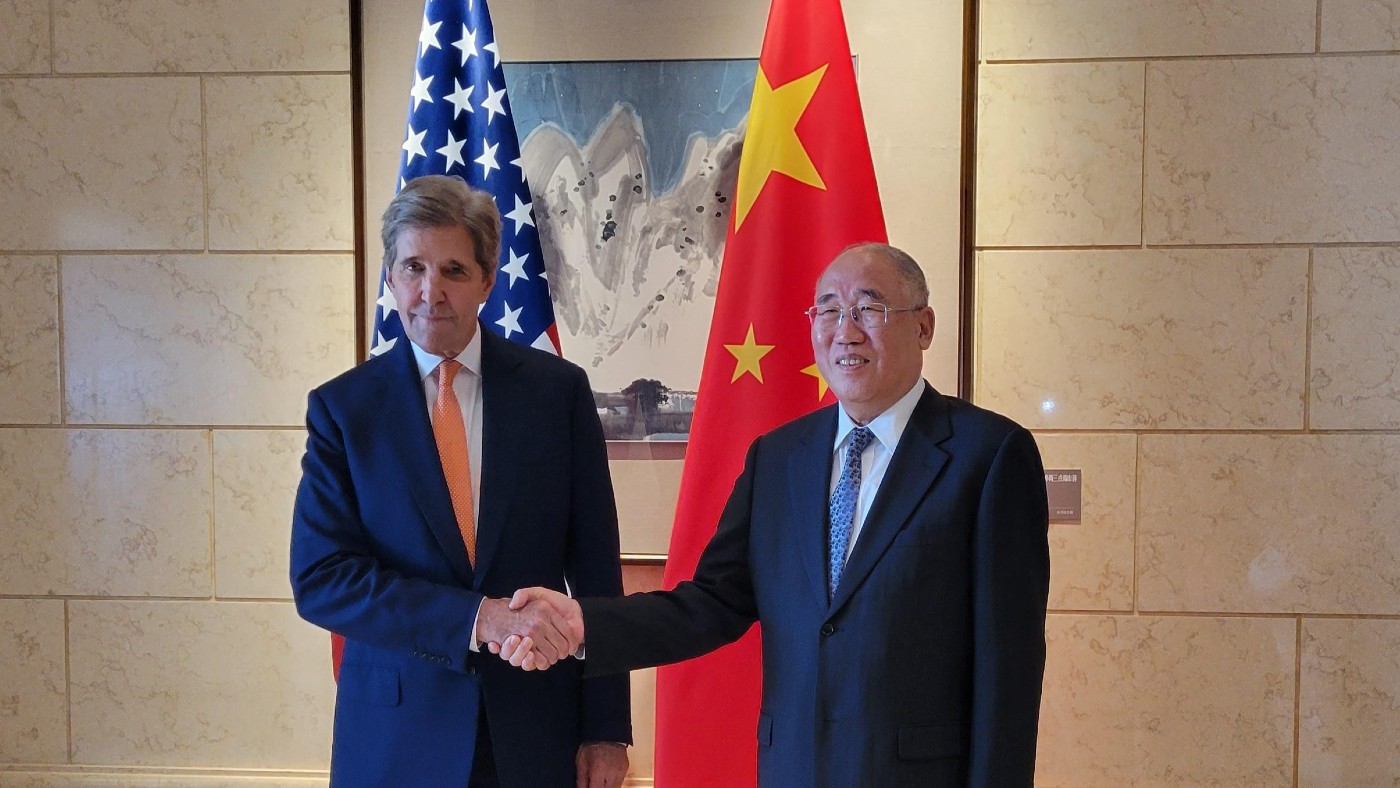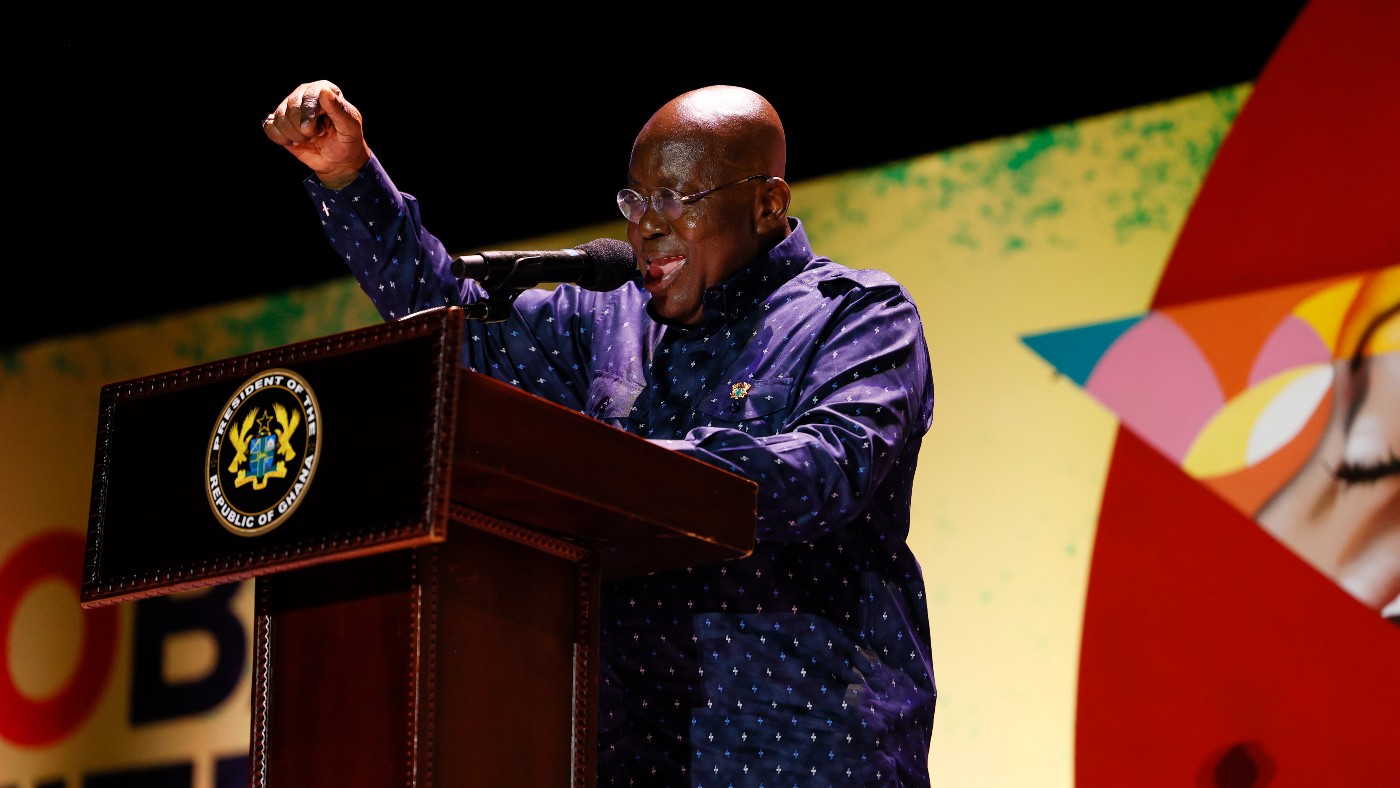John Kerry in Beijing: how red China is turning green
Climate talks set to resume between Washington and Beijing this week

A free daily email with the biggest news stories of the day – and the best features from TheWeek.com
You are now subscribed
Your newsletter sign-up was successful
US climate envoy John Kerry arrived in Beijing yesterday on a mission to restart long-paused environmental negotiations with China.
Kerry touched down as China endures a sweltering summer, with temperatures reaching more than 52C in the northwest on Sunday, “setting a record for a country that was battling minus 50C weather just six months ago”, said Reuters. The US has also been hit by a heatwave that has seen the mercury climb as high as 49C in the Southwest.
Soaring temperatures are a “global problem”, said CNN’s China reporter Nectar Gan, following the hottest week on record for the planet as a whole. Li Shuo, senior global policy adviser at Greenpeace China, said that “regardless of their political differences”, the climate crisis should bring China and the US – the world’s biggest polluters – “back on the same page”.
The Week
Escape your echo chamber. Get the facts behind the news, plus analysis from multiple perspectives.

Sign up for The Week's Free Newsletters
From our morning news briefing to a weekly Good News Newsletter, get the best of The Week delivered directly to your inbox.
From our morning news briefing to a weekly Good News Newsletter, get the best of The Week delivered directly to your inbox.
“The impacts of climate change have now become a common experience for both countries,” he added. “It’s no longer a hypothetical crisis or analytical challenge, but a living reality that can be felt through the skin.”
Together, the two countries account for nearly 40% of global emissions, which, according to CNN’s Gan, “means attempts to stave off the worst impacts of the climate crisis will need to involve these two powerhouse nations drastically cutting fossil fuel production”.
China may have redefined future prospects for humanity
Kerry is in town for four days to work towards achieving that goal. But while the US is hoping for greater cooperation, China has already set its own ambitious climate targets and taken significant steps towards achieving them.
Three years ago, in a little-noticed speech to the UN, Xi Jinping announced that China would “scale up its Intended Nationally Determined Contributions by adopting more vigorous policies and measures”, adding “we aim to have [carbon dioxide] emissions peak before 2030 and achieve carbon neutrality before 2060”.
A free daily email with the biggest news stories of the day – and the best features from TheWeek.com
According to Foreign Policy’s Adam Tooze, “with those two short sentences China’s leader may have redefined the future prospects for humanity”.
“That may sound like hyperbole,” Tooze said, “but in the world of climate politics it is hard to exaggerate China’s centrality.”
Since Xi’s 2020 speech, China has installed approximately 140GW of new renewable electricity capacity annually – more than the US, the EU and India combined.
In December, China also began work on the world’s largest desert renewable energy project. And the solar capacity installed by China this year alone is on track to eclipse the total solar capacity of the US.
Transition from coal in question
China is leading the way in wind power generation too. In 2021, Beijing constructed more offshore wind capacity “than every other country in the world managed to install” in the previous five years, Forbes reported. As of January last year, China was operating half of all the world’s offshore wind turbines.
All of this amounts to nothing short of remarkable progress. According to a June report by San Francisco-based NGO Global Energy Monitor, China is on track to double its entire renewable energy capacity by 2025, five years ahead of Beijing’s original target date.
Yet China has also been taking some backward steps, including building new coal-fired power plants amid concerns over energy security that arose following months of power shortages in 2021 and 2022.
The speed of China’s transition away from coal is likely to be a major topic of conversation for Kerry during his visit to Beijing, said Chinese climate policy expert Alex Wang, a professor of law at the University of California, Los Angeles.
“It’s almost the number one question that any outsider will have of Chinese officials,” Wang told CNN.
But considering the pace at which China has been pursuing its climate goals compared with the US, Kerry’s Chinese counterparts will doubtless have some equally challenging questions for Kerry.
Arion McNicoll is a freelance writer at The Week Digital and was previously the UK website’s editor. He has also held senior editorial roles at CNN, The Times and The Sunday Times. Along with his writing work, he co-hosts “Today in History with The Retrospectors”, Rethink Audio’s flagship daily podcast, and is a regular panellist (and occasional stand-in host) on “The Week Unwrapped”. He is also a judge for The Publisher Podcast Awards.
-
 Woman accidentally puts nan in washing machine
Woman accidentally puts nan in washing machineTall Tales And other stories from the stranger side of life
-
 The spiralling global rice crisis
The spiralling global rice crisisfeature India’s decision to ban exports is starting to have a domino effect around the world
-
 Bangladesh dealing with worst dengue fever outbreak on record
Bangladesh dealing with worst dengue fever outbreak on recordSpeed Read
-
 Glacial outburst flooding in Juneau destroys homes
Glacial outburst flooding in Juneau destroys homesSpeed Read
-
 Netanyahu’s reforms: an existential threat to Israel?
Netanyahu’s reforms: an existential threat to Israel?feature The nation is divided over controversial move depriving Israel’s supreme court of the right to override government decisions
-
 A country still in crisis: Lebanon three years on from Beirut blast
A country still in crisis: Lebanon three years on from Beirut blastfeature Political, economic and criminal dramas are causing a damaging stalemate in the Middle East nation
-
 Ghana abolishes the death penalty
Ghana abolishes the death penaltyfeature It joins a growing list of African countries which are turning away from capital punishment
-
 EU-Tunisia agreement: a ‘dangerous’ deal to curb migration?
EU-Tunisia agreement: a ‘dangerous’ deal to curb migration?feature Brussels has pledged to give €100m to Tunisia to crack down on people smuggling and strengthen its borders


